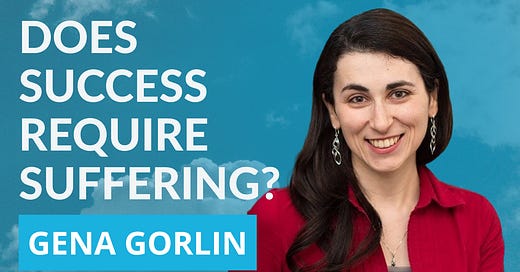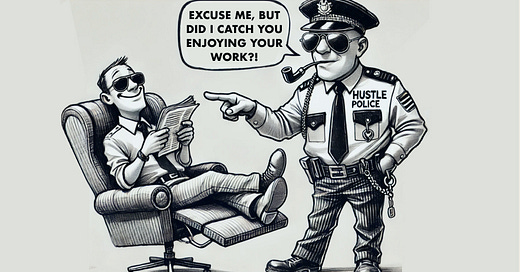Embracing Healthy Ambition | Q&A With Gena Gorlin | #269
Bad ambition vs. good ambition, which wins?
June 22nd, 2024: Greetings from Mexico City! This week is a bit of a guest issue. I’ve recently paused my podcast as I’ve been trying to get a bit more disciplined with my energy and time. But I wanted to interview Gena, so I asked myself, “What if this was easy?” I realized that as a writer, I love getting sent questions via text and writing out responses so I thought she might too. Luckily I was right. I think you’ll enjoy her reflections.
#1 Do We Need To Suffer To Thrive In Life? She says no.
I’ve really enjoyed reading psychologist
’s writing on work and ambition over the last couple of years. Her writing caught my eye again recently when she was pushing back on some of the popular sentiments around what I like to call “suffer porn,” or my accomplishments are because of my struggles. One thing that stands about Gena’s perspective is that she uses a subtly different language than most other people who write and talk about success and achivement. It made me curious, and so I sent her a bunch of questions, hoping should could expand a bit more.#1 The first thing is, why is “raising psychological ambitiousness” controversial among fellow psychologists?
Two related reasons: one, the idea of becoming more ambitious (psychologically or otherwise) sounds challenging and demanding in a way that calls to mind just the sort of perfectionistic, judgmental “inner critic” (or “drill sergeant, as I refer to it) that psychologists spend so much energy fighting against, given all the real harm it does to people. Hence the widespread emphasis on acceptance, self-compassion, nonjudgment, unconditional positive regard, etc. (all loosely falling under what I call the “Zen” tradition) to counteract those harms. A call to “raise your ambitiousness” seems to fly in the face of all those therapeutic efforts, unless of course you disentangle the fake “ambitiousness” of the drill sergeant from the genuine ambitiousness needed to build your own flourishing, fully-lived life.
The second reason is that the field of psychology, like other helping professions, is mainly concerned with alleviating human suffering, and more generally with “raising the floor” on mental health and wellbeing. This is a legitimate and much-needed enterprise in its own right, of course, but I think it neglects the equal or potentially greater (because more fundamental) importance of raising the ceiling—of unlocking new heights of emotional, epistemic, and interpersonal competence among those who are already doing “pretty well” by modern standards.
#2 Gena, when did you stumble upon the phrase radical self-betterment? Why do you like to use that term?
I coined the phrase while noodling on an idea for a blog post that would push back on the common narrative that “radical acceptance” (which I think is a valid and useful practice) implies accepting one’s own ingrained character flaws as a given. My idea was to argue that “radical acceptance” is a crucial prerequisite to, rather than a substitute for, the work of “radical self-betterment,” which anyone can choose to undertake to the extent that they identify certain character traits as interfering with the life they want to live.
I actually haven’t been using the term much lately, now that you mention it, because I worry that it’ll connote the kind of navel-gazing “self-improvement for self-improvement’s sake” that can distract from the real work of building a great life, as I’ve argued elsewhere. But I still like it as a juxtaposition and complement to the notion of “radical acceptance,” and as a reminder that we in fact have a great deal of agency over our own character, should we decide to rebuild it.
#3 In Byung-Chul Han’s book, The Burnout Society, he argues that people are pressured to be “entrepreneurs of themselves” but people never feel like they can never do enough. He hypothesizes that this drives a lot of depression. What do you think about this? I suspect there is a very subtle balance between ambition that’s aligned with what we care about and ambition that is serving the expectations of others. How do you transcend this?
Yes—I think the difference between “ambition that’s aligned with what we care about” (i.e., the builder’s ambition) and “ambition that is serving the expectations of others” (i.e., the drill sergeant’s ambition) is the whole issue. That whole psychological doom loop he’s describing— where you’re joylessly chasing after one meaningless milestone and then another and then another, all in some futile effort to prove something to some arbitrary enforcer who just keeps moving the goalposts—is a telltale sign that you’re operating in drill sergeant mode. The solution is not simply to relinquish control or “cut yourself some slack” for falling short of the drill sergeant’s standards, Zen-style; it’s to question whether and, if so, why these are the standards that actually matter to you, with your fully-lived life as the yardstick. Then, if you decide that achieving such-and-such goal by such-and-such time unlocks experiences or learnings or resources that will add more value to your life than whatever costs they incur (including opportunity costs), than you can attack it with fresh energy and without burnout. And if you decide that it’s not, then you can proudly let go of that goal in favor of something that better aligns with this one life you’re building.
#4 I’m sure you notice a lot of people resharing “suffer porn” - typically stuff from men talking about how some intense struggle or pain is part of the reason they are successful. People love this stuff and share it like crazy. But its never resonated with me. What is your reaction to it?
Yeah, I’ve been on about this a lot lately; the whole idea that success comes from suffering is misconceived to the point of being actually harmful. It’s observationally obvious that the vast majority of people who suffer do not achieve great success, and indeed the correlation between suffering (by any measure—be it stressful life events, trauma, mental health symptoms, etc) and success (by any measure—be it educational attainment, income, life satisfaction, cognitive performance, you name it) is robustly negative, not positive. The kernel of truth in this popular fiction is that nearly everyone experiences some amount of pain and struggle, and successful people are the ones who manage to wrest some wisdom and perspective from their struggles, rather than simply bending under the weight of them. The more fundamental reason they’re able to do this, though, is because they have positive interests, values, virtues that drive them forward, notwithstanding the pain or struggle they must endure along the way.
#5 The interesting thing I find is that beneath the surface these same people talking about pain and suffering almost always LOVE their work, it just that they don’t have the language to communicate it. Why do we struggle to talk about our relationship to work in a positive frame?
Yes, exactly! As to why we struggle to talk about it positively, I think there’s a complicated ideological and cultural history to that question, but the simple answer is just that learning to work and finding and building the work we love is not the default; it’s really hard to do. The very fact that most people have significant choice over the kind of work they do is a historically recent achievement, and we largely have the Industrial Revolution to thank for it. The fact that the Industrial Revolution nonetheless gets so much flack and so little praise is one clue to the cultural/historical reasons why we still struggle to talk about work positively.
#6 I read something from you where you said “Greatness comes from the joyful exercise of agency.” Can you say a bit more about that?
Yes: this was my response to the widely circulated comments by Nvidia CEO Jensen Huang about how “greatness comes from suffering.” Similar to the earlier point about the alleged link between suffering and success: the way we learn to do great work and build great things is, fundamentally, by doing and building, not by fighting or fleeing. From the 2-year-old toddler who proudly drags a chair up to the kitchen counter to get himself a snack, to the 10-year-old elementary schooler who assembles and runs her own lemonade stand, to the high schooler who teaches himself to code so he can build and play video games with his friends—when kids take the initiative to solve problems and generate creative solutions, it’s because of something they want, not because of something they’re trying to avoid. By contrast, look at the children of strict, authoritarian parents who make them do their homework or practice their instrument every day “or else”; by default, these kids learn to play it safe, to opt for passive, slavish compliance over the kind of spontaneous initiative and purposeful, self-directed work that “greatness” requires. These kids then have to unlearn those drill-sergeant-y habits in order to accomplish anything truly great as adults. I know this first-hand, not only because I was one of those kids, but also because I’ve coached many of them as adults.
What children do need in order to learn the skills and virtues required for greatness is the experience of doing and building real things, without the kinds of artificial guardrails that overprotective parents and traditional schooling provide. This certainly increases the chances that kids will encounter some pain and struggle and frustration along the way, as they try to wrest their desired order from the chaos of messy, often uncooperative reality. But this is not the same as “suffering,” and anyway “suffering” is not the point; it’s the learning to do real work, which can be as rewarding and exhilarating as it is exhausting and emotionally fraught.
Anyway, the impetus for persevering through these challenges, and all the increasingly tough challenges that accompany increasingly tough, ambitious projects, is the love of what one is doing and the desire for a valued end goal. All else being equal, such love and desire tend to flourish in conditions of abundance and optimism, not scarcity and fear. That founders and other great innovators so often have a “chip on their shoulder” or some other form of pathology does not explain their greatness; if anything it mitigates their greatness, except insofar as their passion and determination override or compensate for those faults.
#7 You wrote in this article in Every that the tradeoffs to a different kind of like “may not be worth it.” Do you have experiences where people saw what they had to do to improve their lives and were like “eh, I’m good!”?
Yes, definitely—in fact I’ve been one of those people myself!
To be clear, the choice here is not “do I or don’t I make this change that will unambiguously improve my life on the whole”; rather, the choice is “do I or don’t I make this change that will improve my life along certain dimensions and incur costs to my life along others” (which, in fact, is true of any psychological change you might undertake). That’s why I say it’s a “tradeoff”: rebuilding parts of our character or psychology is a big project that takes time and energy, and there are always other ways we could be spending that time and energy.
So, for example, I’ve very consciously chosen not to “work on” building up my tolerance for physical discomfort, even though doing so would certainly widen the scope of potentially valuable activities I could engage in (including sports and other forms of exercise that would almost certainly improve my health). I’ve also chosen not to make a campaign of improving my cleanliness and organizational skills beyond a certain minimally functional point, even though it still costs me the occasional missed email and sets a less-than-ideal example for my kids, among other problems.
I used to either beat myself up about these character flaws (and I do think they’re real character flaws!) or make half-hearted attempts at changing them. But now I’ve made peace with the fact that doing daily physical endurance exercises or working with an organizational coach is not currently worth the opportunity costs—such as the time and energy I could otherwise spend with my ambitious founder clients, or writing essays for my Substack, or relaxing with my family. This is what I mean when I say “your flaws matter less than you think” (which I see as an important complement to that “Radical self-betterment” piece). The point of life is not to chisel away at our character; the point of life is to live, and to reap all the joy and value and meaning we can from living. And it turns out we can often reap more joy and value and meaning from life by leveraging our strengths and virtues than by chiseling away at our deficits.
If you enjoyed this, check out Gena’s writing here:
Hey! Thanks for reading…
I am not sure how you ended up here but might have stumbled upon me through my writing or podcasting on our relationship to work, a topic that has interested me for years.
If you don’t enjoy the writing, I strongly encourage you to unsubscribe below. There’s so much good stuff on the internet!! A reminder: I don’t check unsubscribe alerts and never look at my subscriber list. So if you feel like unsubscribing, you can do so below.
But if you do want to stick around:
If you’d like to meet others on “pathless paths”, you can join The Pathless Path Community
Buy or listen to my book, The Pathless Path. If you’d like to do a bulk order you can do that here for a discount.
You can buy pathless path swag like a hat or shirt here
Subscribe to my podcast and leave a review.
Home Swapping: We’ll likely be using Kindred a bit this summer. It’s a pretty cool home-swapping alternative to Airbnb. If you want to join, use my signup code.
5.5% Savings: Use this link to get 5.5% on your savings on Wealthfront and increase your runway on your pathless path
Affiliates: In addition, I recommend all of the following services: Ali Abdaal’s YouTube Course, Collective for setting up an S-Corp in the US (recommended >$60k revenue), Riverside.fm for HD podcasting, Descript for text-based video editing, Transistor for podcast hosting, Podia or Teachable for courses, Skystra for WordPress Hosting, and Circle for running a community.
Submissions: Want to share your journey with my audience? I accept drafts for submission.



















Terrific interview! I loved the unraveling of the myth that genuine ambition necessarily comes with intense personal suffering. I also appreciated Gena's idea that we don't have to fret about fixing all our shortcomings, perceived or real. My favorite takeaway (among many) is about honoring "the genuine ambitiousness needed to build your own flourishing, fully lived life." Thank you for this rich, thought-provoking conversation!
We don’t need to suffer to thrive, but we probably need to try and do “less.” We are only human, we can only influence of direct impact so much. Our ability to confront entropy is and will always be limited. Thus, when it comes to betterment, limiting oneself is often the key